Physical Address
304 North Cardinal St.
Dorchester Center, MA 02124
Physical Address
304 North Cardinal St.
Dorchester Center, MA 02124

The June 2025 Lok Sabha session turned out to be one of the most intense and closely watched parliamentary sittings in recent years. The session began on June 3, 2025, and was marked by a packed agenda including the passage of key economic and social bills, spirited debates between the ruling BJP-led NDA and a revitalized opposition bloc, and moments that reflected both hope and growing polarization in Indian politics.
This session was the first after the recent reshuffling of cabinet ministers and also came at a time when the country is preparing for state elections in Maharashtra, Jharkhand, and Haryana. Political observers have called this session a “precursor to the 2026 General Elections.”
One of the most contentious topics in this session was rising inflation and youth unemployment. Opposition leaders from the Congress, TMC, DMK, and AAP questioned the government’s handling of food prices, fuel hikes, and job creation.
The Finance Minister defended the government by citing global factors such as oil supply shocks and the war in Eastern Europe. However, opposition MPs demanded a white paper on employment data, alleging discrepancies between government figures and ground reality.
The debates reached a peak when Congress MP Rahul Gandhi accused the government of “economic mismanagement and favoritism towards corporate giants,” prompting a sharp rebuttal from the Prime Minister himself.
Another notable development was the visible unity among opposition parties. The INDIA alliance, a coalition of 16 parties, held joint press conferences and staged coordinated walkouts. This was particularly evident during debates on education policy reforms and farmer protests.
Leaders like Mallikarjun Kharge, Mamata Banerjee, and Arvind Kejriwal reiterated their plan to present a united front in 2026, calling the BJP’s rule “autocratic” and vowing to restore democratic institutions.
The session attracted strong reactions from the media and civil society:
Despite the legislative achievements, the session wasn’t free from controversy:
With just under a year to go for the 2026 General Elections, this session has laid the groundwork for major political battles. The ruling party is likely to project its achievements on welfare and digitization, while the opposition will focus on economic inequality and democratic erosion.
Public attention will now shift to the Monsoon Session in August 2025, where debates on climate policy, GST reforms, and defense spending are expected to dominate.
The Lok Sabha June 2025 session was a pivotal moment in India’s legislative calendar, marked by impactful bills, fiery speeches, and a preview of the electoral battles ahead. As India stands at a socio-political crossroads, the debates and decisions from this session are likely to resonate far beyond the Parliament walls.